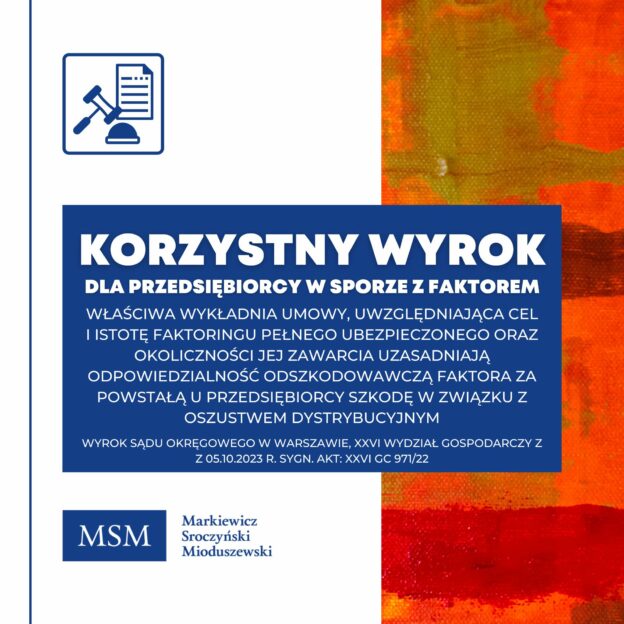We are pleased to announce that yesterday there was a favorable verdict for our client in a payment case involving a factoring agreement against a bank as a factor. The case involved fully insured factoring, which, in addition to financing receivables, involves the factor assuming the risk of non-payment for the transaction in cooperation with the factor’s insurer. The client submitted a French counterparty for factoring, claiming to be responsible for supplying goods to a French grocery chain. The client had not worked with this counterparty before and wanted to use the professional services of a factor who claimed to specialize in verifying counterparties and ensuring the security of transactions. The transactions were approved by the factor, and the goods were shipped to France. It was only after the fact that the client discovered that he had been the victim of a distribution scam and had shipped the goods to an entity that merely impersonated a supplier to a French chain store and never received payment for the goods. The client believed that the factor was liable for the loss of the client’s failure to receive payment for the goods because the client relied on the factor to verify the security of the transaction – if the factor had not approved the transaction, the client would not have chosen to ship the goods to France. The factor evaded liability in its entirety, pointing out that assumption of risk does not apply in cases of fraud, and maintained that the factoring agreement did not obligate the factor to conduct a detailed verification of the counterparty, and that the factoring agreement does not relieve the client of the obligation to verify counterparties on its own. In the course of the proceedings, we demonstrated what the purpose and essence of the insured’s full factoring was, and that it was the factor’s primary burden to verify the credibility of the counterparty before including the receivables in the factoring, and pointed out the steps that the factor should have taken for this purpose, which it failed to do. The court agreed with our arguments and took the position that a proper interpretation of the contract, taking into account the purpose and essence of the insured’s full factoring and the circumstances of its conclusion, justified the acceptance of the factor’s liability for the resulting loss at 50%. The court ruled that the customer (as a businessman) and the factor are half responsible for the damage to the customer in the form of non-payment for the goods. The case was handled by attorney Monika Mierzejewska of our law firm. The case was conducted by the District Court in Warsaw, XXVI Commercial Department under case number XXVI GC 971/22. The judgment is not final.

